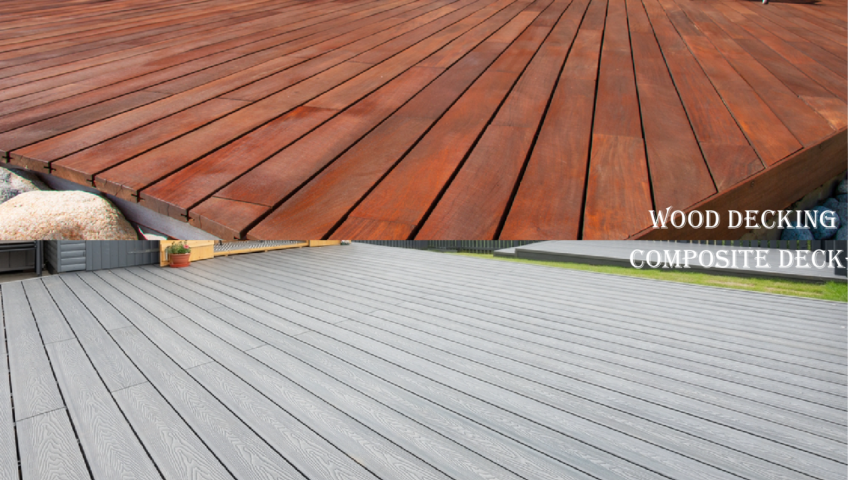-

Composite Decking vs. Wood: A Detailed Comparison to Help Homeowners Choose the Right Material for Their Decking Needs
When it comes to building a deck, the material you choose plays an integral role in the longevity and cost of your project. Homeowners typically waver between two popular options: traditional wood and composite decking. Each has its merits and challenges, and choosing the right one can significantly impact the enjoyment and value of your outdoor space. In this comprehensive guide, we’ll dive deep into the differences between wood and composite decking to help you make an informed decision. At the end, remember that Bayou City Lumber is here to provide expert advice and competitive quotes for all your decking needs.
Understanding the Basics: What Are Wood and Composite Decking?
Wood Decking is traditionally made from either softwood or hardwood. Softwoods, like pine, cedar, and spruce, are commonly used due to their natural resistance to rot and pests. Hardwoods, such as ipe and teak, are prized for their exceptional durability and strength.
Composite Decking is made from a blend of wood fibers and plastics, which are molded into board shapes. This material is designed to mimic the look of wood while offering enhanced durability and lower maintenance requirements.Durability and Maintenance: A Key Consideration
One of the most significant differences between wood and composite decking lies in their durability and maintenance needs.
Wood Decking requires regular care, including annual cleaning, staining, and sealing to protect against weathering, fading, and moisture-induced decay. Over time, wood can warp, crack, or splinter if not adequately maintained.
Composite Decking, on the other hand, boasts high durability with minimal maintenance. It is designed to resist fading, staining, scratching, and mold growth. Most composite decks only need occasional cleaning with soap and water, which can be a significant advantage for busy homeowners.Aesthetic and Customization
While traditionalists often prefer the natural look of wood, modern composites offer a wide range of colors, textures, and finishes that can closely mimic the appearance of various woods.
Wood Decking provides a classic, timeless look but can vary in appearance based on the type of wood and the finish applied. It can be painted or stained in any color, offering limitless customization options.
Composite Decking has evolved significantly in aesthetics. Initially criticized for its somewhat artificial look, advancements have allowed it to closely resemble real wood, including options that feature grain patterns and varied colors.Environmental Impact: A Growing Concern
For environmentally conscious homeowners, the choice of decking material also involves considering the ecological impact.
Wood Decking can be a sustainable choice if sourced from responsibly managed forests. Look for certifications like FSC (Forest Stewardship Council) to ensure the wood is harvested sustainably.
Composite Decking is often touted as a green alternative since it is made from recycled plastics and wood fibers. However, it’s worth noting that it is not biodegradable and recycling of composite materials can be more complicated than recycling pure wood.Cost: Initial vs. Long-Term Investment
The upfront cost is another crucial factor to consider. Typically, wood decking materials are less expensive than composite materials. However, the long-term costs of maintenance can add up.
Wood Decking may require additional budget for stains, sealers, and potentially replacement boards due to damage or wear over time.
Composite Decking usually has a higher initial cost but can save money in the long run with lower maintenance costs and greater durability.Installation: Ease vs. Expertise
Wood Decking is generally easier to cut and install than composite decking, which can be denser and require specific tools for cutting and fastening.
Composite Decking often requires special fasteners and techniques but comes with the advantage of hidden clip systems that provide a clean, nail-free look.The Verdict: Which is Right for You?
Choosing between wood and composite decking boils down to your specific needs, preferences, and budget. If you love the classic look of wood and are prepared for the maintenance it requires, wood could be the best choice. If you prioritize durability and minimal upkeep, composite decking might be the way to go.
Why Choose Bayou City Lumber?
At Bayou City Lumber, we understand that building a deck is a significant investment. That’s why we offer a wide range of both wood and composite decking materials to suit any project and budget. Our experts are on hand to guide you through the choices and find the perfect solution for your outdoor space.
Ready to Get Started?
Feel free to contact us for a free quote and expert advice on all your wood and decking needs. Whether you’re leaning towards the rustic charm of cedar or the modern appeal of composite, Bayou City Lumber is here to help you build the deck of your dreams. Let us help you make your backyard the perfect retreat for relaxation and entertainment. Visit us today and take the first step towards your ideal outdoor living space!
Contact Info
Bayou City Lumber
11106 Telephone Rd, Houston,
TX 77075, United States
